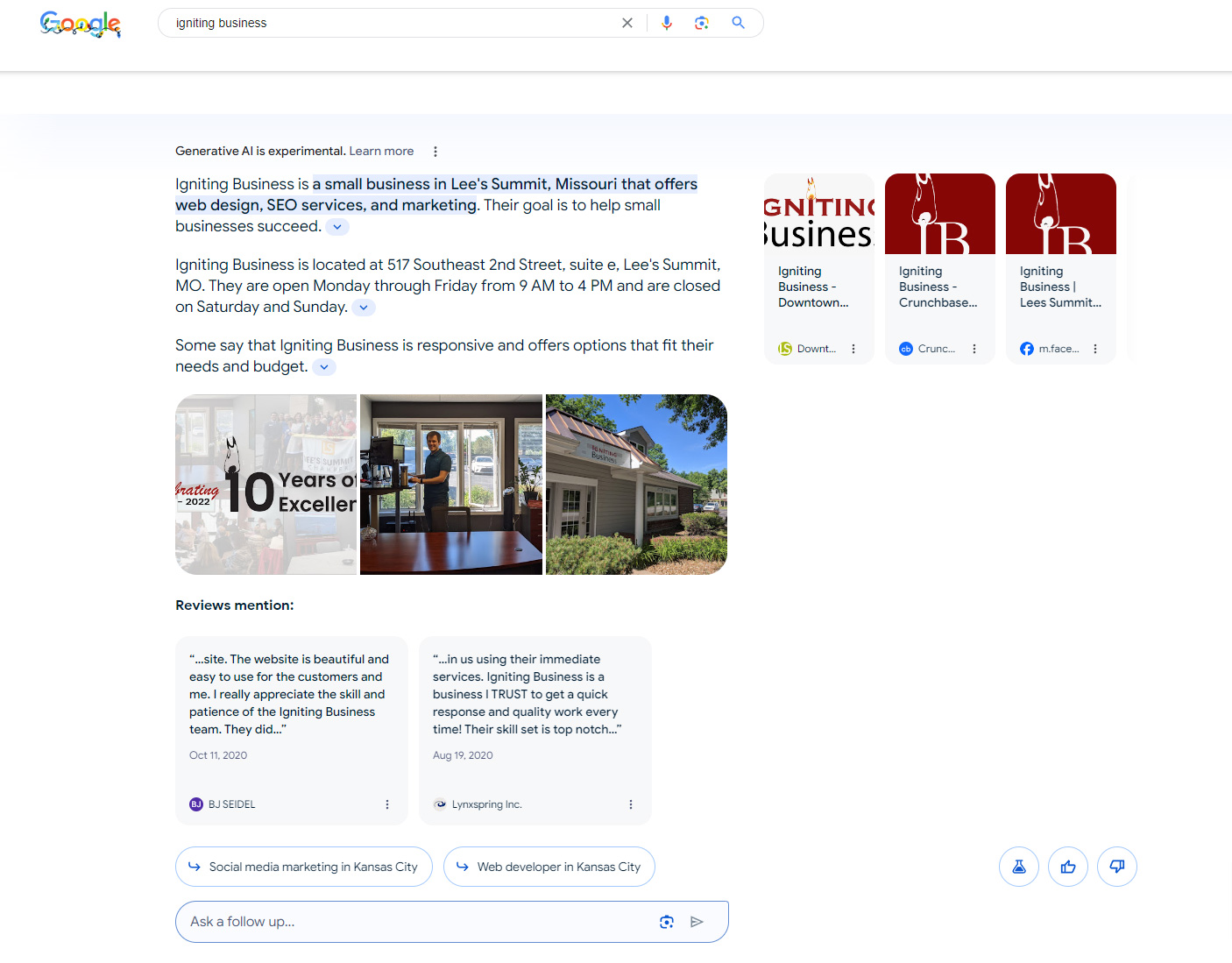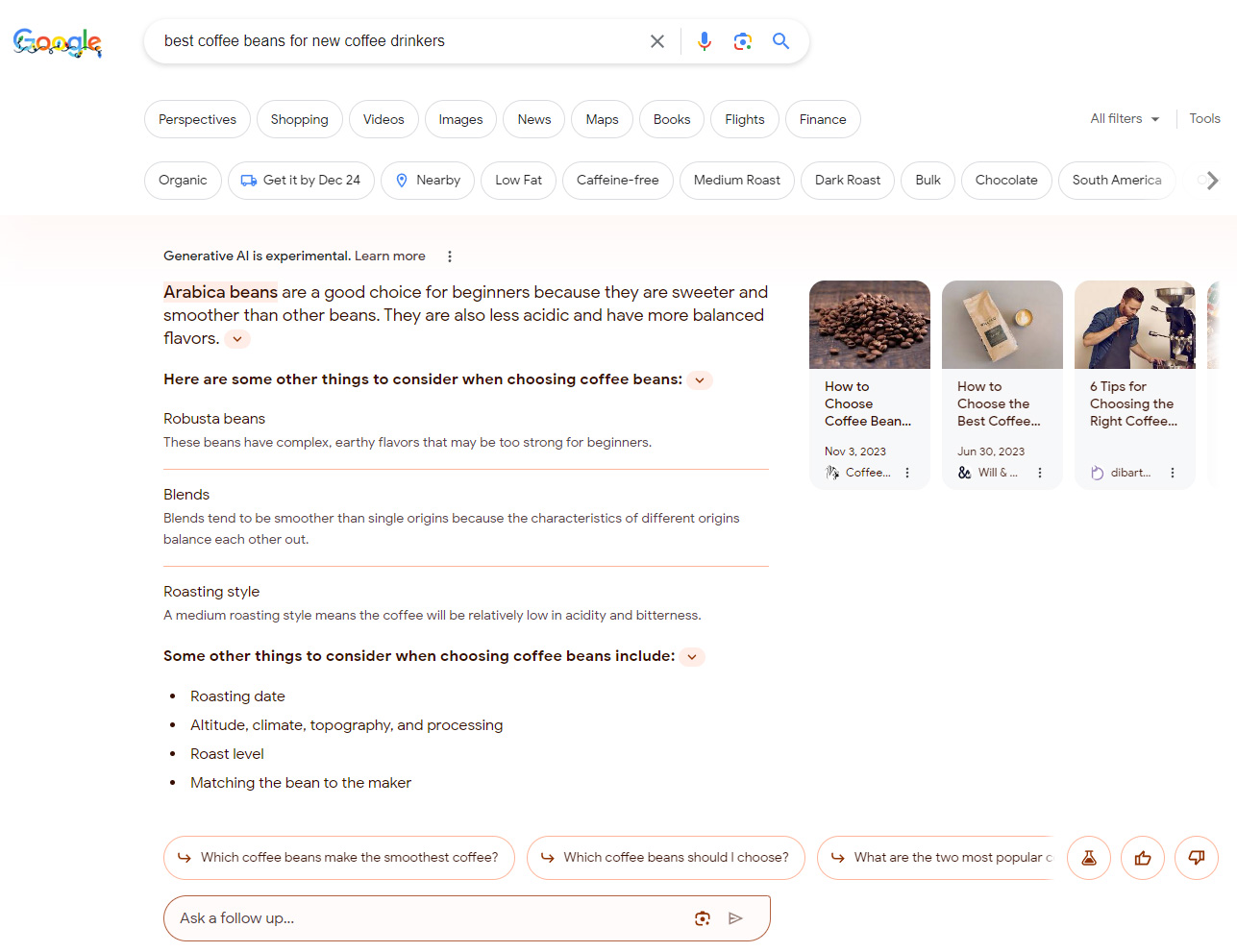What Is Google’s AI Overview (Formerly Search Generative Experience) and How Will It Impact Businesses?
Google’s AI Overview is a modified search experience within Google which leverages cutting-edge, generative AI to dynamically respond to users’ queries. Essentially, Google Search will use its AI, powered by large language models (LLMs) to first, truly understand, and second, respond to your query with a very customized, holistic, and helpful answer.
Prior to May 2024, the AI Overview within Google Search was known as "Search Generative Experience" (SGE). However, when Google rolled out this feature to the public during Google I/O 2024, it renamed it to a simpler moniker, "AI Overview."
At a high level, Google states that that AI Overviews should make it easier for people to:
- Ask new kinds and formats of questions that are both more complex and descriptive. With AI Overview, the generative AI will be able to better understand and respond to these queries in comparison to a normal search results page.
- Get the overall gist of the topic faster than scrolling through results on a search engine results page (SERP). AI Overviews will still also provide links to relevant information for more information.
- Get started on a task that you need to accomplish rapidly, like writing a draft post or generating an image directly from within search.
- Allow for subsequent conversational follow-ups with the search engine to either clarify questions, dig deeper, or determine next steps.
Table of Contents
A Quick Analogy for Understanding Google Search Vs. AI Overview – Puzzles or Paintings

A relatively easy-to-understand analogy is the thought that Google Search operates like a puzzle. You search for an answer or request a particular piece of information, and Google brings back multiple puzzle pieces that may “fit” what you are looking for based upon its complex algorithm. Google displays those puzzle pieces as links on a page or rich snippets for you to evaluate and click to dig deeper. With Google Search, you are still ultimately responsible for deciding where the pieces fit and putting together the full picture.
In contrast, Google’s AI Overview acts like a talented and knowledgeable artist with a blank canvas. You ask it a question or describe what you are looking for, and generative AI does its best to understand your request and paint a robust, complete picture of the answer based on its cumulative knowledge. Additionally, as you observe the output (the painting), you can talk with the artist (via the AI Overview section) to ask it follow-up questions. Google's generative AI then hones and adds detail to its painting, thereby improving the information. As a result, you get a more robust painting and understanding of the topic-at-hand directly within the search results.
AI Overviews Are Experimental
Currently, Google’s AI Overview is experimental and was tested throughout 2023 and into the first half of 2024 with a select group of opt-in users (including multiple team members here at Igniting Business). Google originally stated that AI Overviews would be in experimentation mode until December 2023. However, in December 2023, Google removed the end date from the experiment page’s details and started showing AI Overviews in the US for some users who are not opted in to the Search Labs program. Google stated that this experience was being tested on a "...subset of queries, on a small percentage of search traffic in the U.S."
On May 14th, 2024, Google started the process of rolling out AI Overviews to everyone in the US. This announcement, along with numerous demonstrations of its features was annoucned at Google's 2024 I/O conference. Here's a quick video below demonstrating Google's integration of AI into Google search.
How to Enable AI Overviews
If you're in the US, AI Overviews are now enabled by default. Note that they only show up on certain search queries, and their format may look different based on the search query intent.
If you are interested in joining the growing ranks of users testing AI Overviews in other countries, you can sign up via the Search Labs website. AI Overviews are available in over 120 countries and territories across seven languages via the Search Labs opt-in program.
AI Overviews may appear on Google’s search results pages in both the Google App and on Chrome Desktop.
How to Turn Off AI Overviews
Unfortunately, there is no immediate way for turning off AI Overviews within the US. However, if you want to get back to a more "plain" experience that only shows a list of websites, you can click the new "Web" tab below the search bar. If you don't see the Web option right away, click the "More" tab, and "Web" should be selectable under the dropdown.
Keep in mind though that this "Web" view removes more than just the AI features. It also filters out any sort of web feature using Google's Knowledge Graph data (e.g. local map packs, featured snippets, etc.). This stripped down view reminds me of the "10 blue links" in the early days of Google Search.
Known Limitations and Issues with AI Overviews
As with any experiment, there are certainly issues plaguing AI Overviews. However, this is a necessary part of the development process and Google continues to refine and improve its AI Overview feature and overall integration of AI within SERPs (Search Engine Result Pages). That said, it is important to have a basic understanding of these limitations since many of your visitors and customers are now using AI Overviews.
The following are several core limitations you may encounter when either you personally use AI Overviews, or when a potential customer uses an AI Overview to learn about your business or products/services:
- Misinterpretation During Corroboration – Even if generative AI technically interprets the input of your query, it may provide output (an answer) with a different meaning due to slight misinterpretations of language nuances.
- Hallucination – Hallucination is a widespread problem with all LLM-based systems (e.g. Gemini, ChatGPT, etc.). An AI Overview may occasionally misrepresent facts or inaccurately identify insights that it “believes” are true.
- Bias – The AI Overview system is trained using high-quality web extracted data. However, that data still ultimately comes from human authors, and, as a result, can lead to narrow representations of people and potentially negative contextual associations. Google puts in place numerous safeguards against biases; however, some certainly can still slip through.
My Experience with Ever-Changing AI Overviews
My Team and I at Igniting Business received early access to the Search Generative Experience (SGE), AKA AI Overviews. I personally began testing the new search experience on 5/26/23, so I've had quite a bit of time to play around with the system. That said, AI Overviews has changed drastically. Countless new layouts, color highlights, display options, link/citation tests, etc. have all been rolled out, recalled, modified, and improved.
Even since the public launch of AI Overviews, I've seen massive amounts of testing and tweaking on Google's end and do not anticipate that trend will change anytime soon.
Overall, I do see several areas where AI Overviews are both alarming and exciting.
Positioning and Overall Footprint of the AI Overview
For queries that an AI Overview is present for, it often appears at the very top of the page above the traditional organic results. As a result, if you have worked hard to earn your top spots in the search engine pages, it is likely that an AI Overview will overtake your position simply by being a new feature rolled out. Additionally, just because you ranked well in the organic search results before does not mean you will be shown within an AI Overview.
That said, since AI Overviews are still an experiment, where and how often an AI Overview will appear is still yet to be finalized. Additionally, this is a new piece of search real estate in which your website is eligible to appear.
Potential for More Zero Click Searches
As many early adopters have pointed out, an AI Overview is able to answer many questions directly within the search engine which may eliminate the need for a searcher to visit an actual website to read the full answer. This creates the possibility that users will simply use AI Overviews to get their answers without visiting an actual website, yielding what the SEO and digital marketing community begrudgingly calls a “Zero Click Search.”
Keep in mind that Google does currently cite (and link to) sources within AI Overviews, so it is still possible to earn a click if a user truly does need additional information. However, with an AI Overview's answers being fairly robust, the need to click a link may become secondary.
Increases the Need for Your Content to Be Helpful
Since AI Overviews are powered by robust LLMs including an advanced version of MUM and PaLM 2, it is able to understand both simple and fairly complex queries with its own set of “trained” (or “learned”) knowledge. Technically, it learns this knowledge from its training datasets which include millions of websites and resources interconnected throughout the web.
Thus, generative AI's impressive base knowledge requires your resources to be truly unique and authoritative in order to justify referencing it within its generated answers.
Improvements to the User Experience
While change is always difficult for the masses, change is also the harbinger of technological advancement. What if we all rejected the microwave due to its magic-like cooking ability? I personally would eat far less popcorn, and reheating leftovers at lunch would be much more arduous.
Yes, change can be scary, but almost every great technological advancement has a combination of excitement and intimidation. I choose to focus on the excitement of how AI can make life easier and online searching more helpful for its users.
Ultimately, Google is still sticking to its goal of making the search experience the best it possibly can be for searchers.
How Local Small Businesses Should Prepare for AI within Google Search
Small businesses have come to rely on Google’s search engine for visibility and as a primary source of organic leads. We recognize and fully understand that any change to this system can feel threatening for small businesses.
Proper steps to optimize your business to appear within AI Overviews are still widely uncertain, especially as AI Overview formats continue to change and evolve in Google's experimentation period.
However, five core principles remain important and will bolster your optimization for both Google Search and AI Overviews:
Continue Creating High-Quality, Helpful Content for Your Customers
It is critically important to create truly helpful content for your customers. Make sure your content reflects your unique experience and insights. Google is continually implementing ways to reward and showcase truly unique perspectives and quality content to its users. If you have high quality content, Google will be more likely to reference it within an AI Overview and Google Search.
Ensure Your Company’s Information Online Is 100% Accurate
Accurate company information includes data about your company, its founders and key leadership, contact and support information, and common business data (e.g. name, address, phone, hours, service categories, service areas, policies, etc.). This helps decrease the likelihood that an AI Overview will share incorrect or outdated information about your company.

Build Your Reputation
Look for ways to continue to build your reputation and trustworthiness online. This could include collecting reviews from customers, serving as an expert source for journalists, earning backlinks from industry-related websites, and more. These efforts will aid improving your E-E-A-T (Experience, Expertise, Authoritativeness, and Trustworthiness) in both the eyes of potential customers and search engines.
Engage with Vetted, Professional Help When Needed
Depending on the importance of organic traffic to your business, it may be wise to seek professional help from an SEO company. Keep in mind that just because a company says they do SEO, does not mean it is a well-developed skillset. For example, many web designers will say they “do SEO” when all they mean is they enable an SEO plugin, which is not going to get you very far.
We recommend carefully vetting an SEO company to ensure they offer solutions that match your needs. Also, we would recommend asking them about their experience thus far with generative AI and how they see it impacting their strategies on a go-forward basis.
Stay Up-To-Date on SEO News
Given that AI Overviews are still currently in a state of flux, we highly recommend staying up-to-date by following credible leaders within the SEO industry. We have put together a list of the best SEO newsletters and blogs that we personally follow here at Igniting Business.
Of course, you could also subscribe to our free monthly newsletter which is geared towards small business owners/managers and multi-discipline marketers.
About the author
Ben Seidel is the CEO and Founder of Igniting Business. Ben has been serving hundreds of small businesses with web design and SEO services for over 15 years and covering digital marketing related topics since 2012.
Over the years, Ben has been recognized on a local and national level, including entrepreneurship awards from both the NFIB and NASE and being featured in publications such as CNBC Universal, Yahoo News, Intuit Small Business, CIO.com, Mizzou Magazine, and Fox Business.
